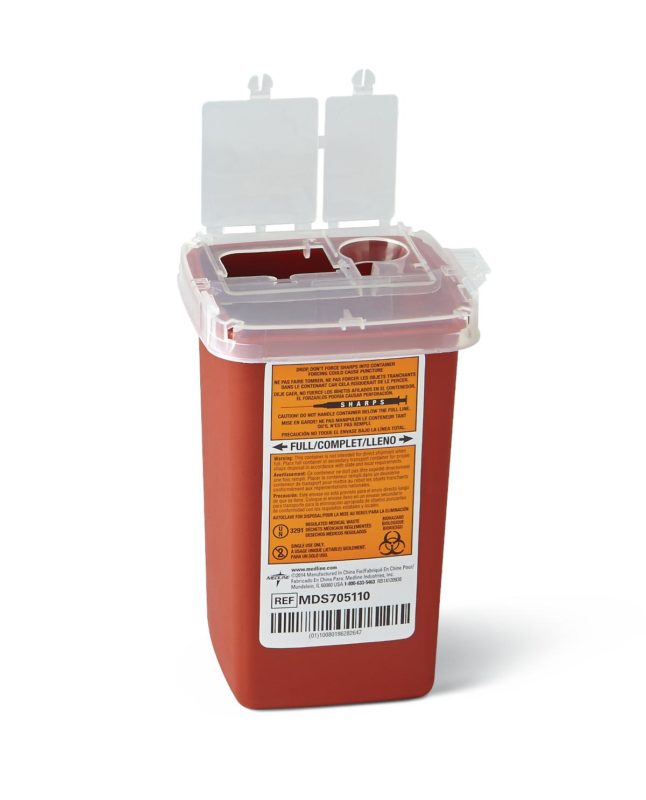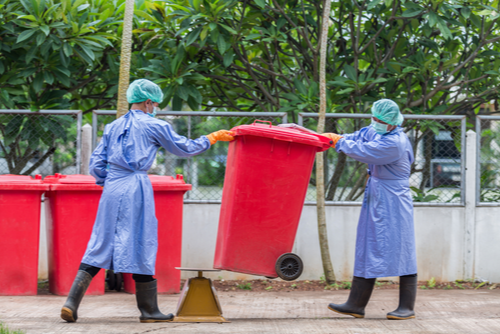Your Relied On Companion: Medical Waste Removal Services Tailored to Your Needs
Wiki Article
The Relevance of Proper Clinical Garbage Disposal: A Guide for Healthcare Facilities
Correct medical waste disposal is a vital element of healthcare center administration, making certain the safety and well-being of clients, team, and the atmosphere. From understanding the different groups of clinical waste to conforming with regulatory requirements, healthcare facilities have to take on reliable waste partition practices and select proper disposal techniques.Recognizing Medical Waste Categories
Recognizing clinical waste groups is vital for correct disposal in medical care centers. Medical waste is a wide term that includes different kinds of waste created in medical care setups, such as laboratories, facilities, and hospitals. Categorizing clinical waste helps ensure that it is handled, saved, and disposed of safely and according to relevant guidelines.There are several groups of clinical waste that health care facilities require to be knowledgeable about. These classifications include infectious waste, sharps waste, pharmaceutical waste, chemical waste, and radioactive waste (medical waste disposal services with WasteX). Each classification has details qualities and calls for different disposal methods to lessen the threat of harm to healthcare employees, patients, and the atmosphere
Transmittable waste, for instance, refers to squander contaminated with potentially infectious materials, such as blood, body liquids, and cells. Drug waste consists of ended or unused medications, while chemical waste is composed of unsafe chemicals used in clinical procedures.
Compliance With Regulatory Requirements
Healthcare centers need to make certain conformity with regulative requirements for correct clinical waste disposal. Regulatory bodies, such as the Epa (EPA) and the Occupational Safety And Security and Health And Wellness Administration (OSHA), have actually established regulations and guidelines to protect public health and the environment. These laws lay out the appropriate handling, storage, transport, and disposal of clinical waste.Compliance with regulative needs is crucial for health care centers to avoid legal fines, reputational damage, and prospective harm to human wellness and the atmosphere. Failing to adhere to these regulations can cause fines, claims, and even the suspension or cancellation of running licenses.
To guarantee conformity, healthcare centers need to establish comprehensive waste administration programs that consist of staff training, correct waste segregation, and using ideal containers and labels. Routine audits and inspections ought to additionally be carried out to determine any kind of non-compliance issues and resolve them without delay.
It is vital for medical care centers to keep up to date with modifications in regulations and upgrade their waste monitoring techniques as necessary. This can be accomplished by proactively monitoring updates from regulatory bodies and joining training programs and workshops.
Implementing Effective Waste Segregation Practices
To make certain proper medical waste disposal, health care centers must implement effective waste segregation methods. Waste partition is an essential action in the overall waste administration process, as it helps minimize the risk of infection, stops cross-contamination, and guarantees the safe disposal of different types of waste. Effective waste segregation methods include separating medical waste into different categories based on its features and possible threats.One typical practice is the partition of sharps waste, such as needles and scalpels, from various other types of medical waste. Sharps waste must be positioned in puncture-resistant containers to stop injuries and prospective infections. Furthermore, harmful waste, such as chemicals and drugs, need to be divided from general medical waste to protect against ecological contamination.
Correct labeling and color-coding of waste containers are crucial for reliable waste segregation. Clear and visible labels should be put on each container to suggest the kind of waste it contains and any special handling needs - medical waste disposal services with WasteX. Furthermore, color-coding can be utilized to differentiate between various waste classifications, making it simpler for health care team to determine and dispose of waste appropriately
Regular training and education for medical care staff is vital for the successful application of waste partition methods. Employee ought to be informed on the different waste groups, appropriate segregation techniques, and the importance of adhering to waste monitoring procedures. This will certainly aid ensure conformity and consistency in waste segregation practices throughout the facility.
Finding Appropriate Disposal Techniques
Appropriate choice of proper disposal methods is vital in making certain the risk-free and environmentally accountable administration of medical waste in healthcare facilities. Health care centers produce a variety of medical waste, consisting of find here sharps, transmittable waste, pharmaceutical waste, and chemical waste - medical waste removal. Each kind of waste requires particular disposal methods to minimize the threat of contamination, injury, and ecological injuryOne typical disposal technique for medical waste is incineration. Incineration entails the regulated burning of waste at heats. This method works in damaging microorganisms and decreasing the quantity of waste. It can release unsafe contaminants into the air if not correctly regulated.

Chemical disinfection is an additional method utilized for sure sorts of clinical waste, such as pharmaceutical waste. This approach utilizes chemicals to reduce the effects of or destroy impurities. Nevertheless, it is very important to select chemicals that are ecologically pleasant and secure.
In many cases, garbage dump disposal may appropriate for non-hazardous medical waste (medical waste disposal services with WasteX). Nonetheless, proper partition and product packaging are vital to avoid leak or contamination.
Ultimately, healthcare centers have to thoroughly assess the qualities of their medical waste and select ideal disposal techniques that focus on safety and security, environmental management, and regulative compliance. Normal training and tracking are necessary to make certain that medical care you could try this out personnel follows correct disposal protocols.

Training and Educating Team on Correct Disposal Procedures
Personnel education and training play an essential duty in guaranteeing the correct disposal of clinical waste in medical care facilities. It is necessary that all employee, including physicians, registered nurses, specialists, and support staff, get thorough training on proper disposal procedures. This training needs to cover the different sorts of clinical waste, their possible dangers, and the ideal methods for managing, setting apart, and dealing with them.One of the primary goals of reference team education and training is to make sure that all medical care professionals recognize the significance of appropriate disposal treatments and the possible effects of incorrect waste administration. They require to be familiar with the risks connected with clinical waste, such as the transmission of infections and the contamination of the setting. medical waste removal near me. By comprehending these dangers, personnel will certainly be more motivated to follow proper disposal methods and take the necessary safety measures to safeguard themselves, their associates, and the area
Educating should likewise cover using personal protective equipment (PPE) and the proper techniques for handling medical waste. Personnel ought to be informed on exactly how to identify and segregate different kinds of waste, such as sharps, infectious waste, and hazardous chemicals. They should also be trained on the correct use waste containers, such as sharps containers and biohazard bags, in addition to the value of labeling and securing these containers properly.
Furthermore, staff education and learning and training should consist of routine updates and refresher courses to guarantee that healthcare specialists stay informed about the most up to date laws and finest methods in clinical waste disposal. This recurring education is vital to preserve a high level of understanding and compliance among team member.
Conclusion
In final thought, proper medical waste disposal is of utmost value for medical care centers. Comprehending the various groups of clinical waste and abiding with regulative needs makes certain the safety and well-being of both medical care employees and the basic public.From comprehending the various classifications of clinical waste to conforming with governing requirements, health care centers must embrace reliable waste segregation techniques and choose ideal disposal methods. These classifications consist of infectious waste, sharps waste, pharmaceutical waste, chemical waste, and radioactive waste.To make certain proper medical waste disposal, medical care facilities need to apply effective waste segregation techniques. Waste segregation is a vital action in the total waste administration procedure, as it aids decrease the risk of infection, stops cross-contamination, and makes certain the safe disposal of different types of waste. Health care centers create a selection of clinical waste, including sharps, infectious waste, pharmaceutical waste, and chemical waste.
Report this wiki page